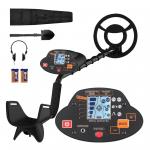
Metal Detectors for Adults and Kids, Professional Function Gold Detector with LCD Display & IP68 Waterproof Search Coil for Find Valuables
SKU: GW50.0097
A
Answer: The detection depth of all metal detection instruments has a great relationship with the area, shape and weight of the metal being detected. Generally speaking, the larger the area and the greater the quantity, the greater the corresponding detection depth; conversely, the larger the area, the greater the quantity. Small, the smaller the number, the smaller the corresponding depth. The depth marked by the instrument is the maximum depth that can be achieved under optimal conditions according to the industrial standards of the product. The detection depth will also be different under different soil conditions. For example, if the soil is moist or dense, the signal strength of the metal being detected will be weakened and the detection depth of the instrument will be reduced. In addition, the detection depth will also be attenuated when the battery is low and the transmitting power is insufficient. In this case, please replace the battery in time.
A
Answer: The detection effect will be improved if the soil is dry or the metal is buried for a long time. The older the metal is buried, the deeper the detection depth. Because metal will gradually oxidize when buried underground for a long time, the metal rust will spread to the surroundings and react with the surrounding soil, generating a strong magnetic field, increasing the area of the metal and increasing the intensity of the signal. The longer the time, the greater the signal strength, and the deeper the detection depth will be!
A
Answer: The detection depth of underground metal detectors is related to the metal material and shape of the objects being detected and the soil quality of the detection site. The detection depth of the same detector in different regions is completely different, because underground metal detectors are designed based on geological characteristics. , so the detection depth of the underground metal detector cannot be detected in the air (that is, suspended in the air). The best detection effect can only be achieved when the metal detector and the earth have a magnetic induction balance. If it is suspended in the air, the magnetic induction balance cannot be achieved! For example, if a silver dollar can be detected 20 centimeters in the air, then if the silver dollar is buried underground, the detection depth will be greatly increased, and the longer it is buried, the easier it will be to detect, because the metal is buried for a long time. The ground will gradually oxidize, producing metal rust that spreads around and reacts with the surrounding soil, generating a strong magnetic field, increasing the area of the metal and increasing the signal strength.
A
Answer: Do not detect in rainy days, because except for the detection coil (suitable for shallow water areas), the instrument itself does not have a waterproof function. If water enters the circuit board, it may cause a short circuit or other failures. Remove the battery when not in use, as the battery may leak and corrode the circuit board if left in the instrument for a long time. Please store it in a dry place when not in use for a long time.
A
Underground metal detectors are suitable for use in various terrains, including grasslands, beaches, forests, hills, etc., but may be disturbed in extremely harsh environments.
A
The sensitivity of the underground metal detector can be adjusted through the adjustment button or menu on the controller, and different sensitivities can be selected according to needs.
A
Underground metal detectors emit electromagnetic fields. When the electromagnetic fields encounter underground metal objects, they will produce reflected signals. The detectors receive and analyze these signals to determine the location and type of the metal objects.
A
Underground metal detectors can detect a variety of metals, including iron, copper, aluminum, gold, silver, and more.
A
To a certain extent, weather will have an impact on the use of underground metal detectors. For example, humid weather may affect the detection depth, and it is not suitable to use detectors in thunderstorm weather.
